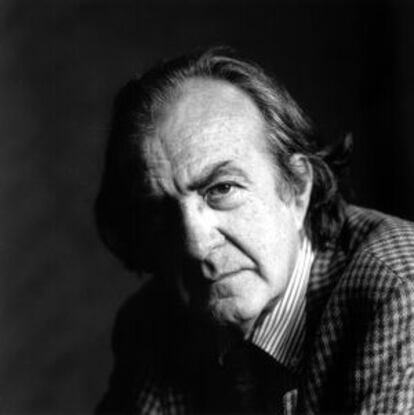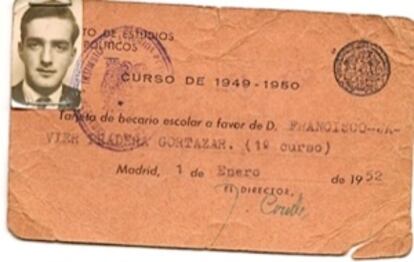Pushed from right to left
The late EL PAÍS journalist Javier Pradera is the subject of a new book It examines his journey from Francoist family to Communist Party card carrier


The journalist Javier Pradera, who died last year, was a child socialized under Francoism. More than that, he grew up in a family on the winning side of the Civil War who had a right to feel resentment - his father and his grandfather were killed in 1936 by Republican rifles. So something, or indeed many things, must have failed in the regime's moral, political and religious education process for him to end up in the arms of an ideology on the defeated side - the Spanish Communist Party (PCE), the most reviled of them all - in order to find self-reconciliation.
It was not an easy move, nor did it come without a price. At the presentation last week of his book Camarada Javier Pradera (or, Comrade Javier Pradera, published by Galaxia Gutenberg / Círculo de Lectores), author Santos Juliá said that "Javier, and many like him, risked a lot. Javier put his career on the line at 19 years old, when he decided to join the PCE at the same time as he was studying for the government exams to be admitted to the judicial body of the air force. It was difficult for them, but they experienced it as the liberation from a burden, from a world from which they had been breaking away since they were very young."
The desire to explain why the children of the victors clung to the cause of the vanquished is one of the questions that grabbed Juliá and immersed him in an investigation into the historical context, which straddles the 1950s and 1960s, in which the tectonic plates of the PCE moved, with the ousting of party general secretary Dolores Ibárruri, "La Pasionaria," or the unfurling of the "so-called national reconciliation."
Pradera, who would later become a publisher, columnist and a founder of EL PAÍS and the magazine Claves de razón práctica, was a member of the PCE between 1955 and 1965. It was a choice that, among other things, cost him a year in the military prison at Alcalá de Henares, the loss of his place on the air force's juridical body and expulsion from his course.
He saw it as a moral duty to explain why so many fought against Franco"
Juliá's book focuses on that decade marked by his opposition to Francoism. It includes unpublished legal documents from the Spanish archives, letters between Pradera and Federico Sánchez - an alias of the writer and politician Jorge Semprún, his best friend in the underground - political writings and the beginnings of the memoirs that he never finished.
Pradera, who wrote 2,242 articles for EL PAÍS between May 16, 1976 and November 20, 2011, resisted writing down reflections on his life almost to the end. Penning his memoirs "was a late decision," says his widow Natalia Rodríguez-Salmones. What made him overcome his reluctance was a certain sense of commitment to historical reparation. Those young comrades who had risked their necks were barely anyone to today's generation. "The disappearance of colleagues who died almost in anonymity was very important to him. He saw it as a moral duty to explain why so many people were fighting against Franco," says Rodríguez-Salmones.

Pradera says it himself at the start of what he titled Introducción a unas memorias (or, Introduction to some memoirs): "I would have never taken on that task of recalling personal existence for the teaching of future people, which Ortega y Gasset considered almost a duty, if those materials of personal history had not been absolutely indispensable to a more general reflection on the consequences of the Spanish Civil War of 1936 on the generations who, for family reasons, belonged to the winning side in a conflict to which they were physically unconnected."
Pradera left the PCE "without making any noise," says Juliá. He later became a leading publisher and columnist during the democratic era - new lives that will be the subject of two new books Escritos de la Transición (Transition writings) by Charles Powell, and El diablo en la botella (The devil in the bottle) by Fernando Vallespín.
Tu suscripción se está usando en otro dispositivo
¿Quieres añadir otro usuario a tu suscripción?
Si continúas leyendo en este dispositivo, no se podrá leer en el otro.
FlechaTu suscripción se está usando en otro dispositivo y solo puedes acceder a EL PAÍS desde un dispositivo a la vez.
Si quieres compartir tu cuenta, cambia tu suscripción a la modalidad Premium, así podrás añadir otro usuario. Cada uno accederá con su propia cuenta de email, lo que os permitirá personalizar vuestra experiencia en EL PAÍS.
¿Tienes una suscripción de empresa? Accede aquí para contratar más cuentas.
En el caso de no saber quién está usando tu cuenta, te recomendamos cambiar tu contraseña aquí.
Si decides continuar compartiendo tu cuenta, este mensaje se mostrará en tu dispositivo y en el de la otra persona que está usando tu cuenta de forma indefinida, afectando a tu experiencia de lectura. Puedes consultar aquí los términos y condiciones de la suscripción digital.








































